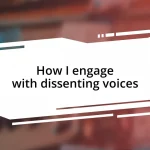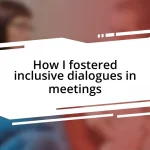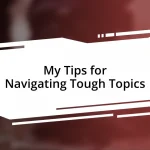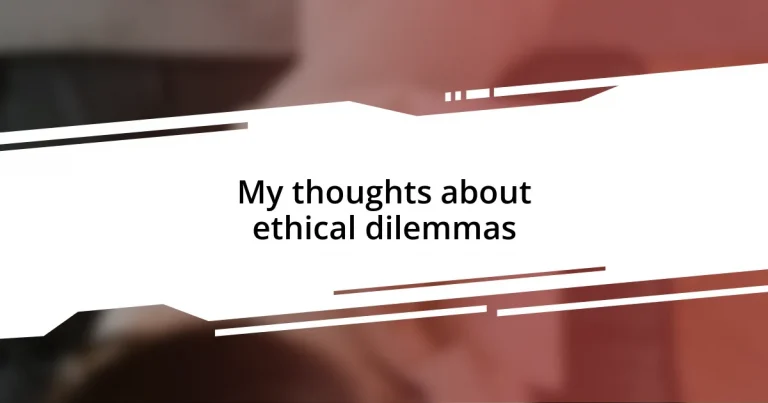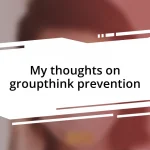Key takeaways:
- Ethical dilemmas often involve conflicts between principles, forcing individuals to reflect on their values and beliefs.
- Common scenarios include issues of loyalty vs. integrity, academic dishonesty, and confidentiality, highlighting the complexity of moral choices.
- Factors such as environment, personal experiences, and peer pressure significantly influence ethical decision-making.
- Practices like “pause and reflect,” seeking diverse perspectives, and applying ethical principles can aid in navigating difficult choices.
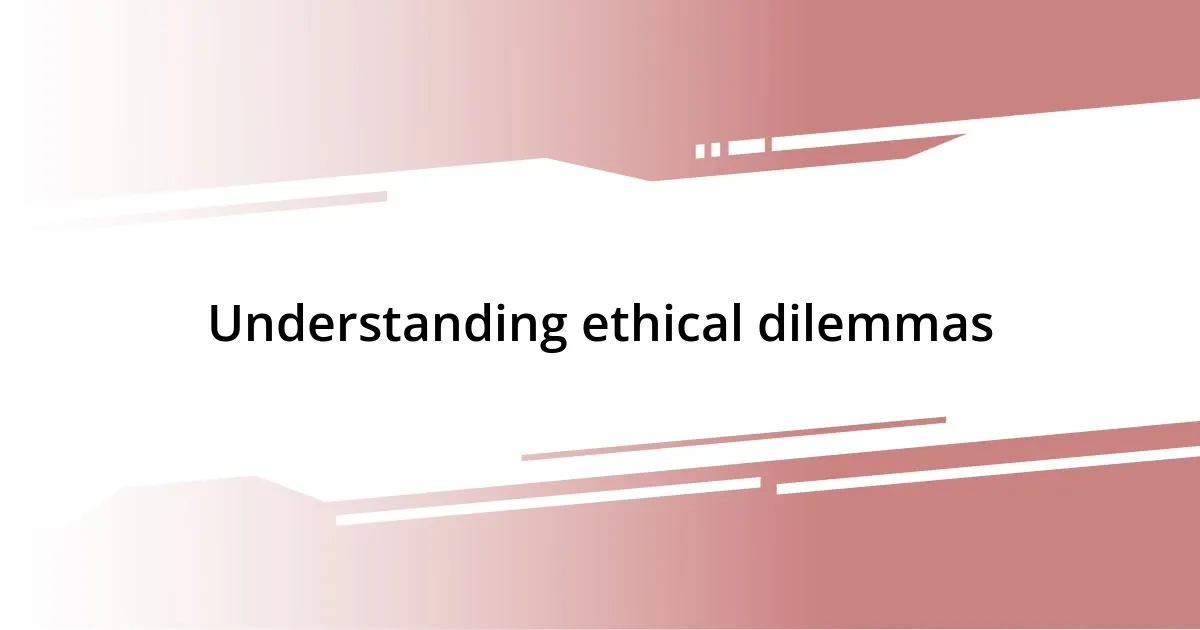
Understanding ethical dilemmas
Understanding ethical dilemmas often requires navigating the murky waters between right and wrong, and it’s not always black and white. I remember a time when I had to decide whether to report a coworker for a minor but habitual infraction—it was painful to think that my choice might lead to consequences that could affect their career. Isn’t it fascinating how these situations challenge our values and beliefs?
At the heart of every ethical dilemma lies a conflict of principles. For instance, I once faced a situation where I had to prioritize honesty over loyalty, and it left me questioning my sense of integrity. Have you ever found yourself grappling with a choice that didn’t have a clear “right” answer? This struggle is what makes ethical dilemmas so compelling; they force us to reflect on what truly matters to us.
Moreover, these dilemmas often evoke strong emotions—fear, guilt, or even relief—depending on the path chosen. I flew out of my comfort zone when a friend, facing a personal crisis, sought my advice on a morally gray decision. I felt the weight of their trust, which made me realize how interconnected our lives are. Don’t you think these moments illuminate the complexity of human morality and our responsibility to each other?
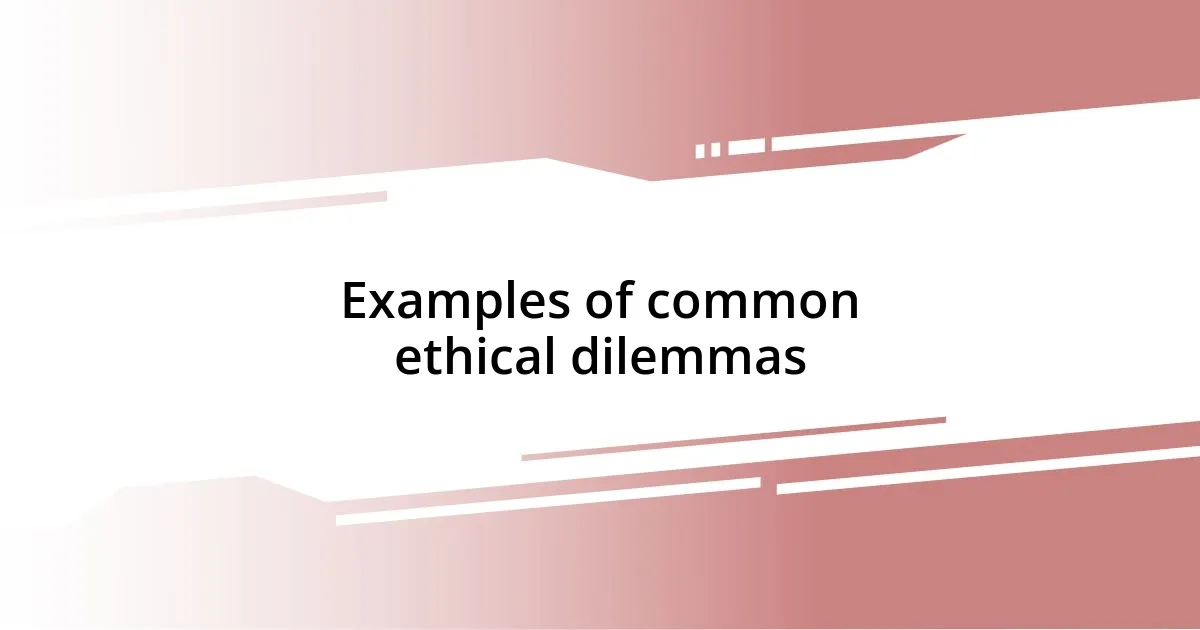
Examples of common ethical dilemmas
When I think about common ethical dilemmas, several scenarios come to mind that many of us might encounter. For instance, imagine being in a situation where a friend confides in you about cheating on an exam. The challenge lies in whether to keep their secret or report it to the authorities—an act that could jeopardize their future but also upholds academic integrity. I’ve been there, caught in that conflict, feeling the pressure of maintaining trust while battling my belief in honesty.
- Cheating: Reporting a friend or peer for academic dishonesty.
- Workplace Disloyalty: Choosing whether to inform your boss about a colleague’s unethical behavior.
- Medical Ethics: Deciding whether to disclose a patient’s illness to their family against their wishes.
- Confidentiality: Knowing a secret that could harm someone but is entrusted to you in confidence.
- Loyalty vs. Integrity: Balancing the need to support a close friend who is making harmful choices but may not want help.
Another situation that resonates with me involves social media and privacy. Picture yourself discovering that a popular influencer has been misrepresenting their lifestyle. Do you speak out and risk their career, or stay silent? I once experienced a similar conundrum when I found out a friend was portraying a fabricated image on social media. It prompted me to reflect on the impact of such misinformation—not just on the individual involved, but on the broader community that looks up to them. It’s these complex choices that challenge us to consider the greater good versus our personal relationships.
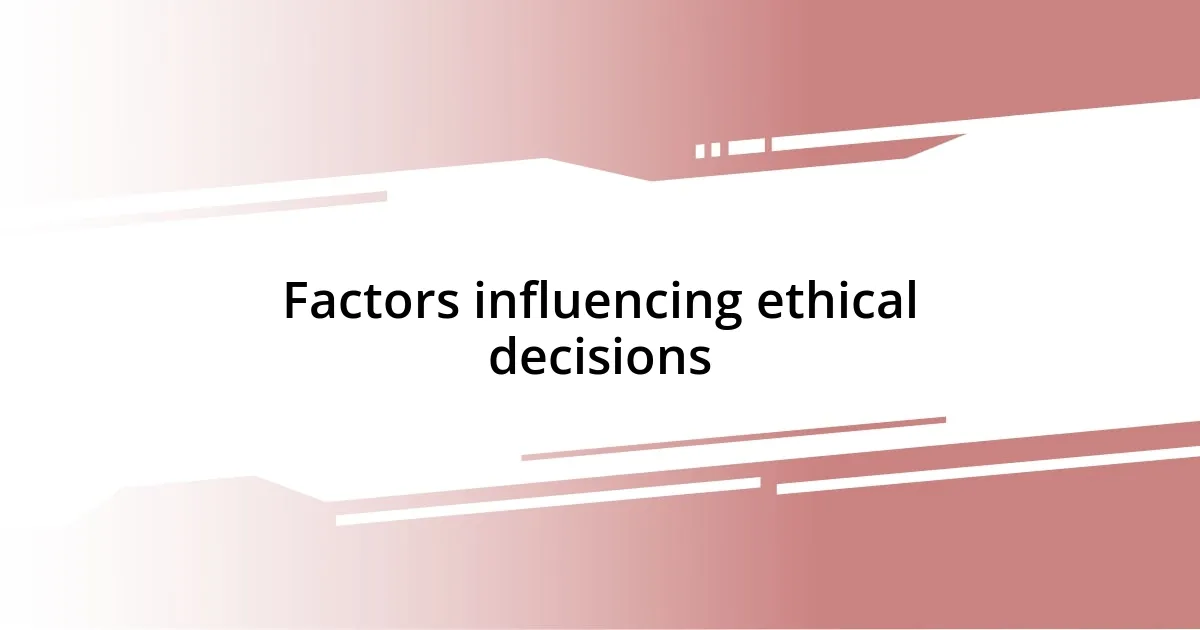
Factors influencing ethical decisions
When it comes to the factors influencing ethical decisions, one’s environment plays a significant role. I recall a time when I was part of a team with a strong focus on transparency and integrity. This atmosphere nurtured a sense of accountability among us. If I had been in a different team that valued competition over ethics, I wonder if my decisions would have differed. How much do our surroundings shape our values?
Personal experiences also deeply affect our ethical choices. For example, my upbringing emphasized honesty and respect for others—a foundation that guides my decisions today. I think about a friend who grew up in a more permissive environment regarding honesty. Their approach often led to clashes in our views on various dilemmas. Isn’t it interesting how our backgrounds can create such varied perspectives on right and wrong?
Additionally, the influence of peer pressure cannot be ignored. I remember feeling torn during a group project when some group members suggested taking shortcuts that compromised our integrity. The tension between wanting to fit in and maintaining my values was real. I ultimately chose to advocate for doing the right thing, reminding myself that true colleagues respect each other’s ethics. Have you ever found yourself in a similar scenario?
| Factor | Description |
|---|---|
| Environment | Surroundings shape values and accountability. |
| Personal Experience | Background influences decision-making processes. |
| Peer Pressure | Desire to fit in can challenge ethical beliefs. |
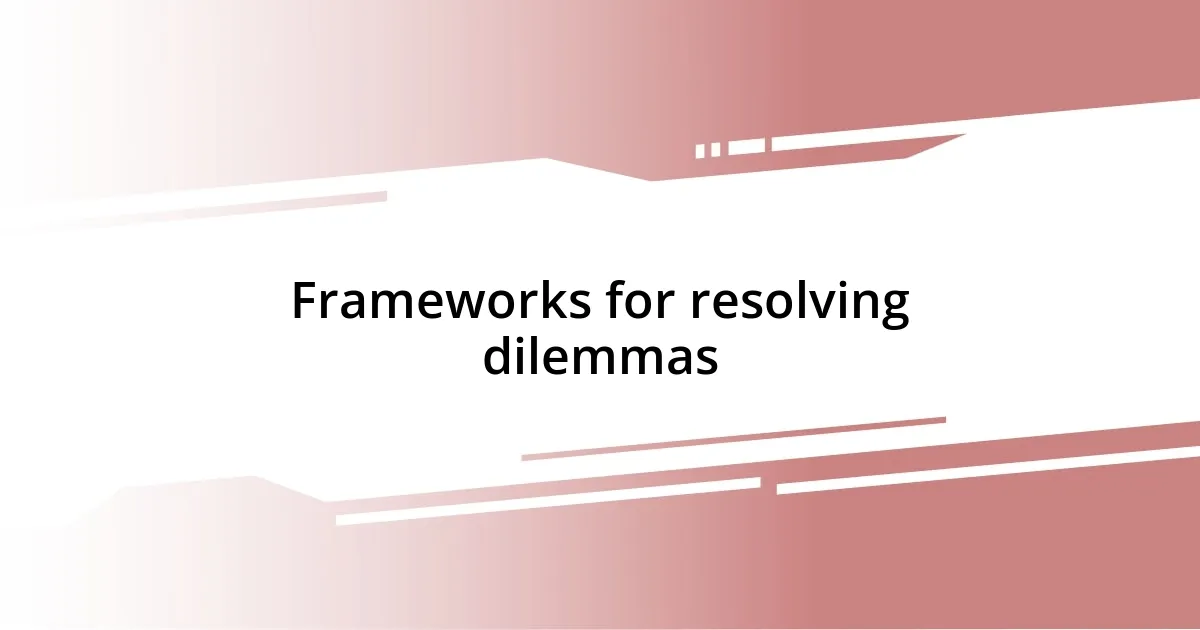
Frameworks for resolving dilemmas
When it comes to frameworks for resolving ethical dilemmas, I often turn to the principles of ethical reasoning. For instance, one classic approach is utilitarianism, which focuses on the outcomes of our actions. I remember a time when I had to decide whether to support a colleague who was being accused of unethical behavior but whose actions, I believed, were justified. Evaluating the overall consequences helped me see that my choice could lead to greater harm than good. Isn’t it fascinating how just one decision can ripple through so many lives?
Another framework is deontological ethics, which emphasizes duty and rules over consequences. I had a friend who worked in healthcare and faced a situation where she had to choose between patient confidentiality and the potential risk of harm to others. Her unwavering commitment to ethical duties led her to seek guidance from her supervisor. I admired her resolve; it made me ponder—what happens when strict adherence to rules clashes with our humane instincts?
Lastly, virtue ethics comes into play, focusing on the character of the decision-maker. I often reflect on how my values shape my responses. In a heated debate about a controversial issue at work, I found myself relying on my core beliefs to guide my stance, allowing me to navigate the conversation with empathy. This approach has taught me that being ethical isn’t just about the decision itself, but also about who I aspire to be—what values do I want to embody? It’s a journey worth examining.
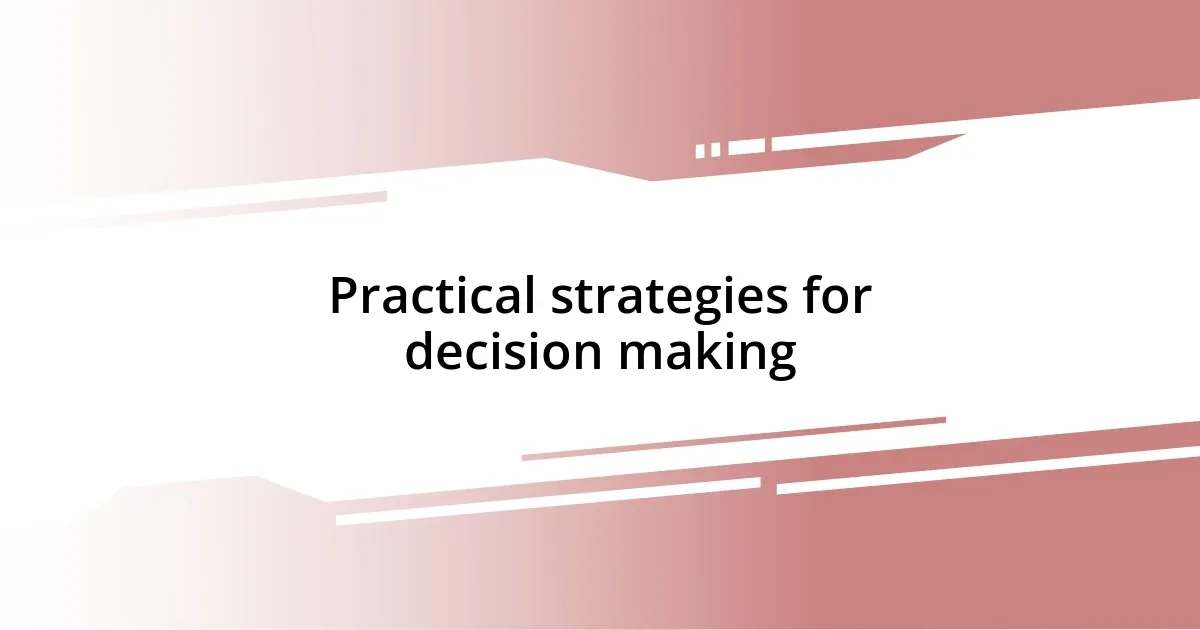
Practical strategies for decision making
When faced with ethical dilemmas, one practical strategy I often utilize is the “pause and reflect” technique. In my own experience, I found that taking a moment to step back can provide crucial clarity. There was a time when I was overwhelmed by a significant decision at work, feeling the pressure to act quickly. By allowing myself that brief pause, I could weigh my options and consider the ethical implications of each choice more thoroughly. Have you ever taken a moment to breathe and realize the answer was clearer than you thought?
Another effective strategy is to seek diverse perspectives before making a decision. I remember confiding in a mentor when I was caught in a moral quandary involving a choice between short-term gains and long-term integrity. Their insights helped me see the broader picture, revealing potential consequences I hadn’t considered. It made me realize that engaging with others can illuminate biases or blind spots I might have. Wouldn’t it be insightful to gather feedback from various sources before arriving at a conclusion?
Lastly, applying simple ethical principles, like the “Golden Rule,” can guide decision-making during tough choices. When I was leading a volunteer project, we faced a decision that would either benefit the team or serve the larger community. Turning to this principle—treating others the way we want to be treated—shifted my perspective entirely. It encouraged me to prioritize the community’s needs over our immediate satisfaction. How often do we forget that a small act of consideration can create a ripple effect of positive change?
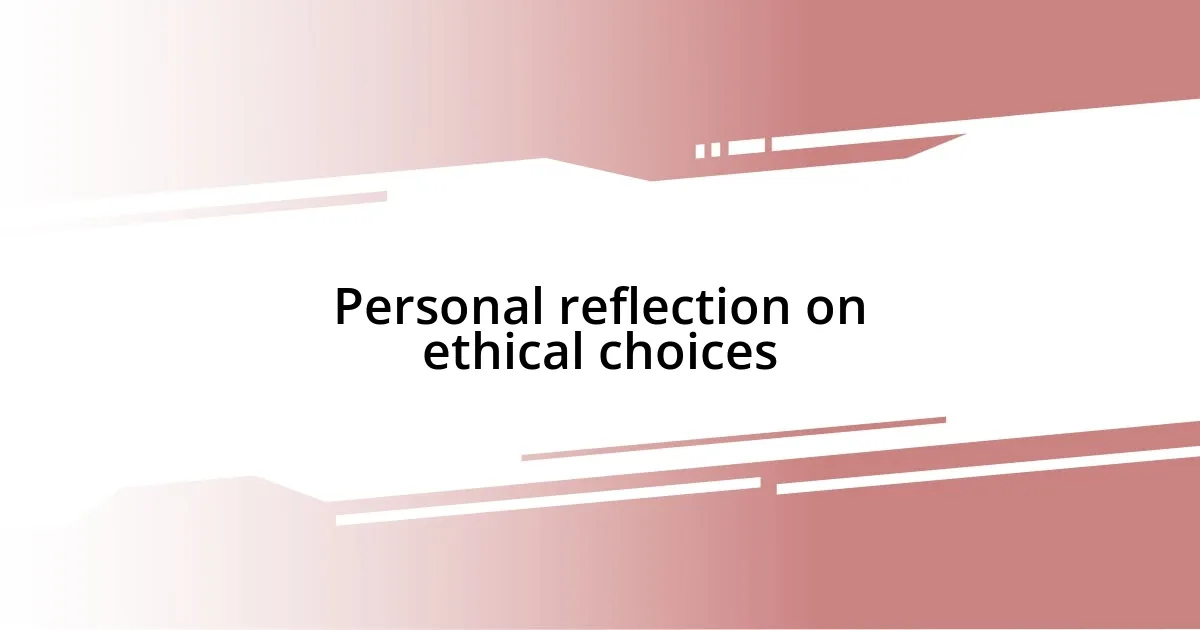
Personal reflection on ethical choices
Reflecting on my ethical choices often brings to mind a moment from my college days. I joined a student organization that was accused of not being transparent in its financing. The pressure to stay silent was palpable, especially as I feared backlash from my peers. However, after taking time to ponder the values I held dear, I chose to advocate for transparency. In that moment, I realized how vital it is to align our actions with our principles, even when the path is fraught with discomfort. Have you ever felt that tug-of-war between your conscience and group loyalty?
There was also a time when I had to navigate a difficult conversation with a friend about their behavior. I felt conflicted about whether to speak up regarding their disregard for others’ feelings. This experience taught me that sometimes, open dialogues about ethics can lead to significant growth. I felt a sense of responsibility—for my friend and for myself—to voice my concerns. In those instances, I often wonder: how can we foster understanding and compassion while still addressing ethical breaches?
I frequently come back to how my upbringing emphasized the importance of honesty, especially in tough situations. One instance stands out when I had to notify my supervisor about a mistake I made. It was daunting, and I was gripped by fear of repercussions. Yet, I realized that owning my errors built trust and credibility, essential pillars of leadership. Isn’t it remarkable how a single choice can shape not only our character but also the environment around us? Engaging in such reflections deepens my commitment to continue making choices that align with my ethical beliefs.
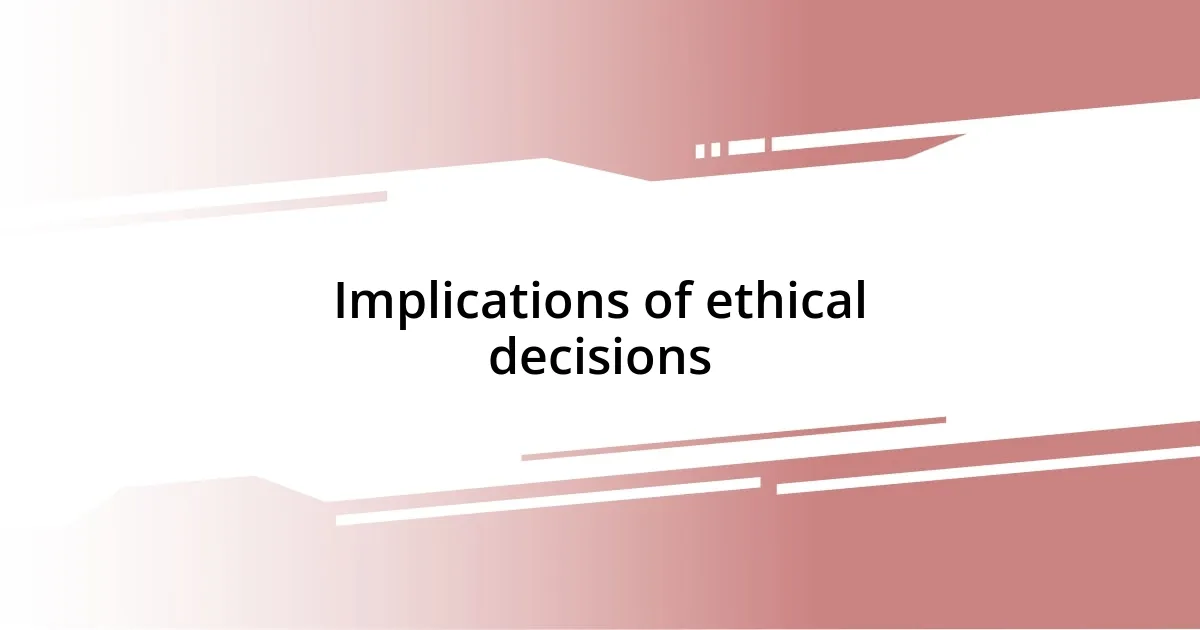
Implications of ethical decisions
Ethical decisions carry weighty implications that extend far beyond the immediate situation. I recall a time when I made a hasty decision to overlook a colleague’s mistake in order to maintain harmony within the team. In the short term, it felt easier, but over time, I noticed a ripple effect: other team members began to feel they could also sidestep accountability. Have you ever experienced a moment when a seemingly small choice snowballed into a larger issue?
The consequences of our ethical choices often shape our reputations and relationships. I once faced a scenario where I had to report unethical behavior I witnessed at work. The internal struggle was intense; part of me feared losing friendships. However, choosing to speak up eventually strengthened my integrity and earned the respect of my colleagues. Isn’t it fascinating how sometimes, preserving our moral compass can lead to deeper connections with others?
Moreover, the long-term implications of ethical decisions can influence our future opportunities. I vividly remember a decision I had to make regarding a potential promotion. I could have taken credit for work I hadn’t done, but I chose honesty instead. While it felt like a setback at the moment, this choice opened doors later because my superiors learned to regard me as trustworthy. How often do we underestimate the power of integrity in shaping our career paths? Each ethical decision we face has the potential to carve our trajectory in ways we might not immediately recognize.
